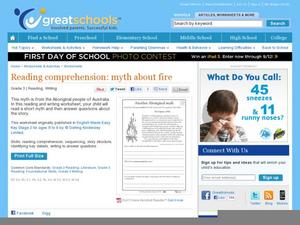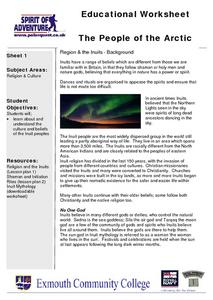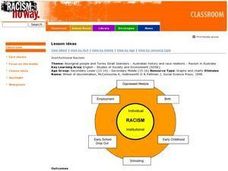Curated OER
Reading Comprehension: Aboriginal Myth About Thunderstorms
Get your anthropologists thinking with this aboriginal myth about thunderstorms. They read the brief myth and answer three comprehension questions. The directions indicate two myths, however there is just one here. Consider extending...
Curated OER
Reading Comprehension: Myth About Fire
No matter what you read, you can always practice locating the main idea and key details to increase reading comprehension. Third graders read about an Aboriginal myth, they then complete three short-answer questions using key details...
Curated OER
Reading Comprehension: Voice of Nature
Understanding a text can be a very interesting task. Fourth graders read a passage describing the origin of an Aboriginal myth. They answer 11 comprehension questions that require them to pull key details, use context, and think...
Curated OER
Diversity: Origin Myths
Fifth graders analyze origin myths and the diversity of First Nations groups. In this history lesson, 5th graders review the geography of Canada and read various origin myths. Students illustrate one of the myths and research others in...
Curated OER
Aborigine Dot Turtles
First graders create Aboriginal Dot Turtles using wax colors or crayons. The class discusses Aboriginal stories and art as a way to practice design. This lesson can be done in two 30-minute lesson segments.
Curated OER
Don't Stop the Weaving
The importance of oral tradition is evident throughout time and across space. Introduce your learners to some interesting stories and then test their knowledge with these questions. Ten multiple-choice questions focus on characters and...
Curated OER
Cultural Creation Myths
Students analyze various cultural creation myths, write essays on three different societal stories, and create a play based upon one of those stories in this cross-curricular Theatre project for High School students. Cooperative...
Curated OER
Facts about Indigenous people Jigsaw
Young scholars examine facts which address common myths and misconceptions. They recognize the resulting racism, prejudice and discrimination. Students brainstorm for common myths based on the stereotyping of Indigenous people.
Curated OER
Etymology
Learners tie together planet names with Greek mythology. Students browse thru a dictionary to see where exactly these names came from and what significance they have. Learners explore the origins of some English words.
Curated OER
Myth of the Western Man
Students identify ways in which history and culture influence identity. They make a time-line and research dates to identify their significance, as well as, create a self portrait pictorially or verbally, that explores the complexity of...
Curated OER
People of the Arctic
Read to learn all about the religion and belief systems of the Arctic-dwelling Inuits. This resource includes an easy-to-follow reading passage that is seven paragraphs in length, and five great critical thinking questions.
Curated OER
Hunt the Fact Monster #20
In this search engine worksheet, 3rd graders will need to use factmonster.com to discover answers. Students will respond to 10 short answer and multiple choice questions using the given website.
Curated OER
Institutional Racism
Students define institutional racism and consider its effects on various groups in society. They discuss what other groups besides Indigenous Australians have experienced institutional racism in Australia? Students research...
Curated OER
Children's Realism
Young scholars use a leading question in order to create context for the lesson. The problem of paying attention to students is discussed in groups. An answer to the problem appears that adults should know the desire of children of being...















